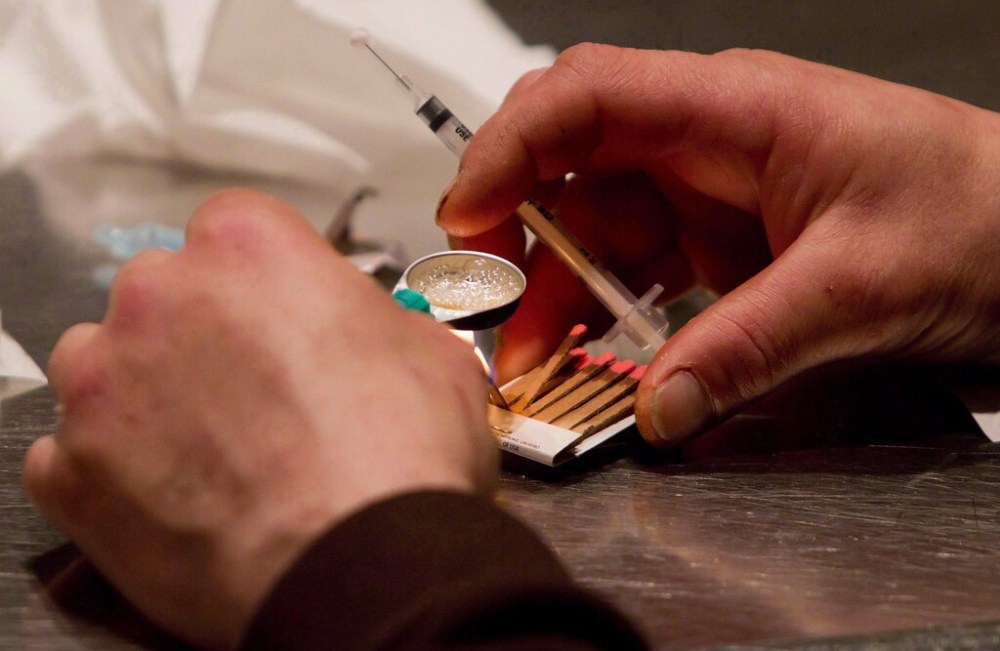Illegal pop-up safe-injection site sends political message
Advertisement
Read this article for free:
or
Already have an account? Log in here »
To continue reading, please subscribe:
Monthly Digital Subscription
$0 for the first 4 weeks*
- Enjoy unlimited reading on winnipegfreepress.com
- Read the E-Edition, our digital replica newspaper
- Access News Break, our award-winning app
- Play interactive puzzles
*No charge for 4 weeks then price increases to the regular rate of $19.00 plus GST every four weeks. Offer available to new and qualified returning subscribers only. Cancel any time.
Monthly Digital Subscription
$4.75/week*
- Enjoy unlimited reading on winnipegfreepress.com
- Read the E-Edition, our digital replica newspaper
- Access News Break, our award-winning app
- Play interactive puzzles
*Billed as $19 plus GST every four weeks. Cancel any time.
To continue reading, please subscribe:
Add Free Press access to your Brandon Sun subscription for only an additional
$1 for the first 4 weeks*
*Your next subscription payment will increase by $1.00 and you will be charged $16.99 plus GST for four weeks. After four weeks, your payment will increase to $23.99 plus GST every four weeks.
Read unlimited articles for free today:
or
Already have an account? Log in here »
Hey there, time traveller!
This article was published 08/09/2021 (1562 days ago), so information in it may no longer be current.
A Winnipeg man went to a field near Higgins Avenue on the long weekend to lay tobacco on the spot where his friend had died of an overdose recently.
To his surprise, three tents had been set up to provide a safe space for people to use drugs.
“When he found out this was an overdose prevention activity, it really moved him,” said Jonny Mexico, co-ordinator for the Manitoba Harm Reduction Network, on Wednesday.

“It’s a very temporary measure, and a very temporary solution to a longstanding problem of overdose death in our province and poisoned supply across Canada.”
The site was illegal. Mexico hopes their decision to open it sent a strong signal to politicians that Winnipeg needs a safe consumption site.
“Every day that passes, another person has died,” Mexico said. “Each of those numbers has a name and each of those individuals has people who loved them dearly and miss them dearly.”
At least 260 people went to the site on the long weekend. Volunteers gave out more than 5,000 syringes and distributed more than 130 Naloxone kits, which are used to reverse the effects of an opioid overdose, Mexico said.
People were also able to get free food, see a nurse and take other harm-reduction supplies such as condoms.
Mexico said the unfunded site, led by community members, filled a gap during a weekend when many community organizations were closed.
“Ideally, there would be multiple locations for supervised consumption where people can use (drugs) in their neighbourhoods,” said Mexico. “It’s a direct community response to the fact that there are over 500 overdose deaths per year, and the fact that there is a lot of government inaction around a solid strategy for harm reduction.”
City Coun. Sherri Rollins, who volunteered at the pop-up site, has been advocating for safe consumption sites in Winnipeg.
“It was the full gamut of harm reduction,” Rollins said.
“We’re experiencing a housing crisis and a drug poisoning crisis, and I do think it’s our job as community leaders to meet community where they’re at. This pop-up met a lot of needs.”
A city report on the feasibility of a supervised drug consumption site will be discussed by council next month.
Rollins noted permanent safe consumption sites have popped up in British Columbia, Alberta, Saskatchewan, Ontario and Quebec.
“What stands out to me here is an ideologically opposed provincial government that is getting in the way, in many cases, of the delivery of primary health care and housing,” she said.
Mexico explained community organizations want multiple sites around the city where safe consumption, drug testing and other services can be accessed.
Many organizations are prepared to host a permanent supervised consumption site in their facility, Mexico said.
“This was the first time this type of action happened in Winnipeg; we provided services, and as a result the world didn’t end. We didn’t see crime go up in the area, people just came in, did what they were going to do and carried on with their day.”
julia-simone.rutgers@freepress.mb.ca
Twitter: @jsrutgers

Julia-Simone Rutgers is a climate reporter with a focus on environmental issues in Manitoba. Her position is part of a three-year partnership between the Winnipeg Free Press and The Narwhal, funded by the Winnipeg Foundation.
Our newsroom depends on a growing audience of readers to power our journalism. If you are not a paid reader, please consider becoming a subscriber.
Our newsroom depends on its audience of readers to power our journalism. Thank you for your support.
History
Updated on Wednesday, September 8, 2021 8:36 PM CDT: Changes quote attribution and detail about Naloxone kit


